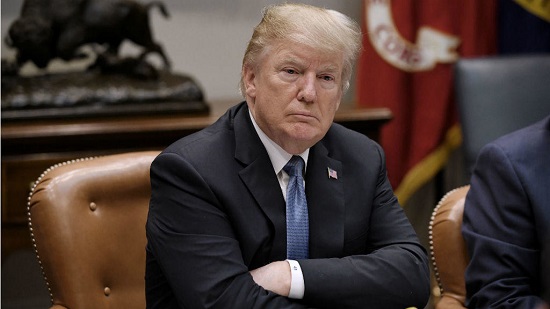When President Donald Trump admitted this weekend that in a July phone conversation with Ukrainian President Volodymyr Zelensky he did, in fact, raise "corruption" accusations against his 2020 political rival Joe Biden and his son, Hunter Biden -- he effectively turned up the volume on calls for his own impeachment.
Trump is Nixon but with more chutzpah and less respect
by CNN
Opinion
00:09
Wednesday ,25 September 2019

"We don t want our people like Vice President Biden and his son creating to the corruption already in the Ukraine," Trump told reporters in describing the call. (There is no evidence of wrongdoing by either Joe or Hunter Biden.) And Monday, sources told CNN that White House officials are considering releasing a transcript of Trump s call with Zelensky.
Now House Intelligence Committee Chairman, Adam Schiff, normally reticent about impeachment, says that if a whistleblower complaint that was revealed last week shows Trump tying military aid to Ukraine to Ukraine probing the Bidens, "we may very well have crossed the Rubicon" on impeachment. Speaker of the House Nancy Pelosi spoke of "a grave new chapter in lawlessness."
Trump s administration has already intervened to keep secret the whistleblower complaint that appears to be related to Ukraine -- thereby blocking the normal process that would inform Congress of the controversy. And in doing so, he has aligned himself more closely with the tragic example of Richard Nixon, who resigned as Congress accused him of high crimes and misdemeanors.
Trump made his regard for Nixon plain to me when, during a 2014 stroll around his office, he paused to pick up a framed letter. The note, signed in blue by the disgraced former President, urged Trump to go into politics. Trump told me he admired Nixon because he was such a good judge of talent.
In my time with Trump, as I gathered research for a biography of him, he criticized Obama, both Presidents Bush, as well as Bill Clinton and Ronald Reagan, but he never said a bad word about Tricky Dick who, it must be said, spent a troubling amount of time on the dark side of politics.
Nixon s "dirty tricksters," among them longtime Trump adviser Roger Stone -- who faces trial in November on charges of lying to Congress and obstructing justice -- worked with a level of creative malevolence that a manipulator like Trump would surely admire. But it was Nixon s hubris, combined with his lies, that proved his undoing. In Trump we hear echoes.
Our current President s lies and misstatements are legion. The current Washington Post count exceeds 12,000. His hubris was on display during the 2016 campaign when he said he could "stand in the middle of Fifth Avenue and shoot someone" and not lose any votes. In office Trump has lived by the same heedless attitude, axing aides -- often for insufficient loyalty -- at a furious rate and turning the federal government into a Trump Tower on the Potomac, where one man rules by his gut instinct.
Of course, the chaos and subsequent ineptitude of the Trump regime separates him from Nixon, whose team was generally effective in administering the government. Nixon s creation of the Environmental Protection Agency and his opening of relations with China, for example, were accomplished because he had deep experience in government.
But one of the impeachment articles that brought down Richard Nixon -- perhaps the most important one -- cited his refusal to release tapes of conversations that he had secretly recorded in the Oval Office. First revealed by White House aide Alexander Butterfield, the tapes proved Nixon s involvement in the Watergate cover-up and made it impossible for him to deny the truth.
Here the comparison with Trump becomes, for the moment, a question mark, since we don t know exactly how the discussion of the Bidens was framed in the phone conversation between Trump and Ukrainian President Volodymyr Zelensky. And now the President seems to be saying he wants to release a transcript of the call.
At first glance this openness suggests a real break from the Nixon stonewalling model, but a glance through recent history suggests Trump may just be more adept than Nixon when it comes to doublespeak.
In his comments Sunday about the transcript, Trump said, "We ll make a determination about how to release it, releasing it, saying what we said." A casual listener would hear in Trump s words a desire to make the call transcript public. But that s not what he said.
In fact, he noted any release would be "saying what we said," which leaves lots of room for editing. Trump also added that releasing the contents of the call would pose challenges to foreign leaders and that intelligence officials may block him from coming clean.
Sunday, both his secretary of state, Mike Pompeo, and his Treasury secretary, Steve Mnuchin, were dispatched to the morning talk shows to caution against the release: "I think it would be highly inappropriate to release a transcript of a call between two world leaders," said Mnuchin.
We have heard this sort of thing before. Trump said he wanted to release his tax returns, as every president has for decades, but that his lawyers wouldn t let him. The same thing happened during the Mueller investigation, when Trump repeatedly said he wanted to sit for the special counsel s questions, but then he followed a strategy that prevented the meeting from ever happening.
Take all the evidence into account and it s easy to see that, like Nixon, Trump s ignoble impulses -- his obfuscation, his self-dealing -- represent a threat to the country and to his own presidency. The difference is a matter of style.
Trump is Nixon, but with far more chutzpah and far less respect for the nation s institutions. He represents a dangerous variation on a tragic type.


